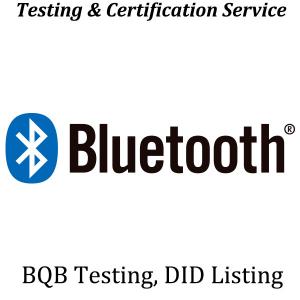

Add to Cart
Smart Bluetooth Speaker/Sound Testing and Certification BQB,WIFI,SIRIM,KC,India BIS,SASO,SABER,PVOC,SONCAP, COC, E-Mark
A new competitive curtain for smart speakers has slowly begun. In addition to volume growth in the future, the entire industry has also begun to enter a new stage of industrial ecological construction. From a longer-term perspective, among smart speaker head manufacturers, regardless of whether they are ecologically open or closed, whether industrial upgrading is fast or slow, what consumers can look forward to is how much ecosystem and social value they can create.
Smart speakers refer to audio equipment that has a built-in
Bluetooth chip and uses Bluetooth connections to replace
traditional wire connections. It can achieve the purpose of
convenience and speed by connecting to Bluetooth playback devices
such as mobile phones, tablets, and laptops. Testing requirements
for Bluetooth speaker test reports to enter Tmall: Product quality
inspection reports can comprehensively and objectively reflect the
quality information of the product, and are generally completed by
a third-party professional inspection agency that is independent of
both supply and demand parties. Third-party professional inspection
agencies are relatively independent and impartial, and are
qualified to issue fair data (test reports) to the society. The
inspection report made by the manufacturer on the products it
produces is called the supplier (supplier) inspection report. Due
to related interests, it is not qualified to issue fair data to the
society.
In addition to the regular evaluation of wireless Bluetooth
speakers, for consumers, what is more important is the performance
of wireless Bluetooth speakers. This part of the test is mainly
judged through detailed scores. The test items are also
multi-faceted, and each link is Closely related to users’ daily
experience.
First, compatibility evaluation. We will select mainstream front-end
platforms: PC, Android, iOS, and Windows Phone 7 to conduct pairing
tests on each mobile Bluetooth speaker. Firstly, we will see
whether it can be successful, and secondly, we will look at the
complicated process of pairing. Look at the number of functions
implemented by the mobile Bluetooth speaker.
Second, transmission distance test. We will simulate testing with and
without physical barriers. Physical barriers are mainly doors and
walls, and horizontally compare the wireless transmission
capabilities of each participating product.
Third, the anti-interference ability test. Simulate the user's actual
usage environment and test situations where radio signals are more
complex, such as whether routers, other 2.4G devices and Bluetooth
devices can successfully connect in an environment shared by each
other.
Fourth, battery life test. We will first find a decibel level for
commonly used volume, and let the volume level of each
participating product reach the same decibel level for continuous
and uninterrupted battery life testing to test its true battery
life.
Fifth, subjective listening test (call quality and music playback
quality). Due to the special functionality of mobile Bluetooth
speakers, we will measure them according to conventional sound
quality standards and consider aspects such as distortion,
resolution, and low frequency to obtain a true sound quality score.
In addition, we will also compare the call quality of Bluetooth
speakers.
Smart Bluetooth Speaker Certification Project
